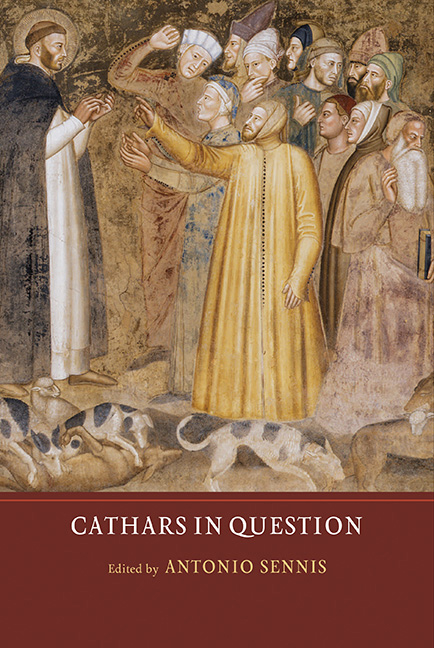Book contents
- Frontmatter
- Contents
- Acknowledgments
- 1 Questions about the Cathars
- 2 The Paradigm of Catharism; or, the Historians’ Illusion
- 3 The Cathar Middle Ages as a Methodological and Historiographical Problem
- 4 The Heretical Dissidence of the ‘Good Men’ in the Albigeois (1276–1329): Localism and Resistance to Roman Clericalism
- 5 The Heretici of Languedoc: Local Holy Men and Women or Organized Religious Group? New Evidence from Inquisitorial, Notarial and Historiographical Sources
- 6 Cathar Links with the Balkans and Byzantium
- 7 Pseudepigraphic and Parabiblical Narratives in Medieval Eastern Christian Dualism, and their Implications for the Study of Catharism
- 8 The Cathars from Non-Catholic Sources
- 9 Converted-Turned-Inquisitors and the Image of the Adversary: Ranier Sacconi Explains Cathars
- 10 The Textbook Heretic: Moneta of Cremona's Cathars
- 11 ‘Lupi rapaces in ovium vestimentis’: Heretics and Heresy in Papal Correspondence
- 12 Looking for the ‘Good Men’ in the Languedoc: An Alternative to ‘Cathars’?
- 13 Principles at Stake: The Debate of April 2013 in Retrospect
- 14 Goodbye to Catharism?
- Index
- Miscellaneous Endmatter
4 - The Heretical Dissidence of the ‘Good Men’ in the Albigeois (1276–1329): Localism and Resistance to Roman Clericalism
Published online by Cambridge University Press: 31 March 2017
- Frontmatter
- Contents
- Acknowledgments
- 1 Questions about the Cathars
- 2 The Paradigm of Catharism; or, the Historians’ Illusion
- 3 The Cathar Middle Ages as a Methodological and Historiographical Problem
- 4 The Heretical Dissidence of the ‘Good Men’ in the Albigeois (1276–1329): Localism and Resistance to Roman Clericalism
- 5 The Heretici of Languedoc: Local Holy Men and Women or Organized Religious Group? New Evidence from Inquisitorial, Notarial and Historiographical Sources
- 6 Cathar Links with the Balkans and Byzantium
- 7 Pseudepigraphic and Parabiblical Narratives in Medieval Eastern Christian Dualism, and their Implications for the Study of Catharism
- 8 The Cathars from Non-Catholic Sources
- 9 Converted-Turned-Inquisitors and the Image of the Adversary: Ranier Sacconi Explains Cathars
- 10 The Textbook Heretic: Moneta of Cremona's Cathars
- 11 ‘Lupi rapaces in ovium vestimentis’: Heretics and Heresy in Papal Correspondence
- 12 Looking for the ‘Good Men’ in the Languedoc: An Alternative to ‘Cathars’?
- 13 Principles at Stake: The Debate of April 2013 in Retrospect
- 14 Goodbye to Catharism?
- Index
- Miscellaneous Endmatter
Summary
On 25 January 1286, before an inquisitorial court presided over by Bernard of Castanet, the bishop of Albi, a citizen from Castres known as Raimon de Baffignac, who had been arrested for the crime of heresy, mentioned in his confession a conversation that he claimed to have had about seven years beforehand with a knight named Guilhabert Lantar, who came from the area of Guitalens. They were lunching together in Albi where they had just met. Both had come to the episcopal city to appear before the ecclesiastical court. As related by Raimon de Baffignac, their observations were so compromising that the judges, or their notary, made sure that they were recorded in direct style, as reported speech, within the interrogation minutes. The two diners were rather unhappy with their affairs at the ecclesiastical court and began by deploring the potentia cleri, the power of the clergy, who had now set science above nobility, depriving the latter of the honours formerly bestowed upon it, which were now cornered by the clerics. According to the document lodged by the Inquisition and that has survived in the form of a single copy made in the sixteenth century, the discussion proceeded as follows:
He also said that he, Raimon, said to the aforementioned Guilhabert Lantar: ‘Sire, in the olden days, we took delight in many things, I mean in courting the ladies, in singing, in making love, but nowadays we spend too much time thinking about the payments and pilgrimages imposed upon us by the clerics, from which we have no means to escape; our predecessors were not made to pay such a high price for these things, or so I have often heard.’ He also said that to what he, Raimon, said to the aforementioned Guilhabert Lantar, the same Guilhabert Lantar replied to the same Raimon as follows: ‘Raimon, Raimon, have no doubt, as we still have a few people who can and do have us pay a fair price for these things; and we will introduce you to them, if you come to visit us on our shore.’
- Type
- Chapter
- Information
- Cathars in Question , pp. 79 - 111Publisher: Boydell & BrewerPrint publication year: 2016



